|
|
|
Sort Order |
|
|
|
Items / Page
|
|
|
|
|
|
|
| Srl | Item |
| 1 |
ID:
147232
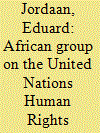

|
|
|
|
|
| Summary/Abstract |
During the early years of the United Nations Human Rights Council, formed in 2006, the African Group obstructed efforts to scrutinize and improve human rights in specific countries, notably in the cases of Darfur and the Democratic Republic of the Congo. However, in recent years the African Group has become willing to address country-specific human rights violations, particularly in Côte d'Ivoire, Libya, and Eritrea. This article documents the African Group's shift and asks why it occurred. Against the backdrop of debates about whether the liberal international order can survive a decline in American dominance, the study of the African Group's shift grants us insight into the elements that underpin liberal internationalism. Three explanations for the African Group's shift are considered: an improvement in the domestic human rights profile of African Group members, changes to the internal dynamics of the African Group, and the influence of the United States. The article concludes that American power was decisive, a finding that raises doubt about whether the liberal international order will survive a decline in American power.
|
|
|
|
|
|
|
|
|
|
|
|
|
|
|
|
| 2 |
ID:
084593
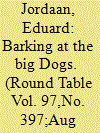

|
|
|
|
|
| Publication |
2008.
|
| Summary/Abstract |
This article places South Africa's foreign policy towards the Middle East in the context of the country's general foreign policy. South Africa is classified as a middle power, given its penchant for international 'bridge-building' and multilateralism. With regard to the Middle East, South Africa has frequently offered itself as a mediator in the region's various conflicts and continues to do so. However, the argument proposed here is that there is an 'anti-imperialist' strain in South Africa's foreign policy that renders it unlikely to be regarded as an impartial broker in the various Middle East conflicts. South Africa's middle power proclivities, as well as its anti-imperialist tendencies, are demonstrated with regard to Iran's nuclear ambitions, the 2003 invasion of Iraq, the Israeli-Palestinian conflict, recent events involving Lebanon, and Hamas's 2006 electoral victory.
|
|
|
|
|
|
|
|
|
|
|
|
|
|
|
|
| 3 |
ID:
090166
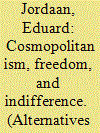

|
|
|
|
|
| Publication |
2009.
|
| Summary/Abstract |
Despite cosmopolitanism's concern for the world's poor and its concomitant heavy moral demands, cosmopolitans establish a limit to the self's responsibility for the global poor. This contrasts with Emmanuel Levinas's view that the self has an infinite responsibility for the other, a responsibility that derives from the self's questioning of the impact of his freedom on others. From a Levinasian perspective, cosmopolitanism's restriction of the self's responsibility for others creates a sphere of rightful indifference to the needs of the other; lends legitimacy to a disregard of the other; forestalls an ethical awakening to the other; constrains the achievement of a more just global order, given that, from a Levinasian perspective, a better justice is built on the self's open-ended responsibility for the other; and points to a tension at the heart of cosmopolitanism, considering the coexistence of elements that both frustrate and aspire to the achievement of global justice. It is concluded that the achievement of cosmopolitanism's goals would require the acceptance of an open-ended responsibility for the other.
|
|
|
|
|
|
|
|
|
|
|
|
|
|
|
|
| 4 |
ID:
093002
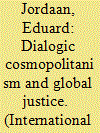

|
|
|
|
|
| Publication |
2009.
|
| Summary/Abstract |
Although the term "cosmopolitan-communitarian debate" never really caught on, a national-global fault line remains prominent in debates about global justice. "Dialogic cosmopolitanism" holds the promise of bridging this alleged fault line by accepting many of the communitarian criticisms against cosmopolitanism and following what can be described as a communitarian path to cosmopolitanism. This article identifies and describes four key elements that distinguish dialogic cosmopolitanism: a respect for difference; a commitment to genuine dialogue; an open, hesitant and self-problematising attitude on the part of the moral subject; and an undertaking to expand the boundaries of moral concern to the point of universal inclusion. While offering much that is attractive, the dialogic cosmopolitan approach ultimately stumbles by failing to include large swathes of the global poor into the transnational moral community it aims to construct and by paying inadequate attention to matters of distributive justice.
|
|
|
|
|
|
|
|
|
|
|
|
|
|
|
|
| 5 |
ID:
072835


|
|
|
|
|
| Publication |
2006.
|
| Summary/Abstract |
During the first stage of the New Partnership for Africa's Development (NEPAD) peer review process, the country under review compiles a report on the state of economic, political, social, and corporate governance in the country. This article examines Rwanda's evaluation of its political governance during this first stage, as reflected in the January 2005 version of this country's self-assessment report. After sketching the compromised political environment in which the report was written, it is indicated how this rosy report inadequately addresses a number of serious political problems in Rwanda, such as Rwanda's involvement in the Democratic Republic of Congo, the inadequate separation of powers in the Rwandan political system, tensions in Rwandan society, and the flawed presidential and parliamentary elections of 2003. While it remains to be seen to what extent Rwanda either acknowledges its political problems in the final version of its self-assessment report, or is censured in the subsequent stages of the peer review process, it is concluded that the greater the failure to do either, the greater the doubt that will linger over the value of the African peer-review exercise.
|
|
|
|
|
|
|
|
|
|
|
|
|
|
|
|
| 6 |
ID:
108506
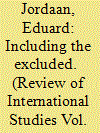

|
|
|
|
|
| Publication |
2011.
|
| Summary/Abstract |
Cosmopolitanism is frequently criticised for overlooking the situatedness of morality and the importance of solidarity in their aspiration to global justice. A number of thinkers take these criticisms seriously and pursue 'a communitarian path to cosmopolitanism'. Four such approaches are considered. All four view morality and justice as grounded in a specific social setting and hold that justice is more likely to result if there is some 'we-feeling' among people, but are simultaneously committed to expanding the realm of justice and moral concern to beyond national boundaries. To enable the theorisation of an expanded realm of situated justice and moral concern, community is conceived as not necessarily corresponding to political boundaries and the moral the self is seen as able and eager to loosen some of its traditional moral connections and to form new ones. Unfortunately, these approaches are likely to exclude significant segments of the world's population from the expanded realm of moral concern they theorise, most notably, a large proportion of the world's poor. It is suggested that the thought of Emmanuel Levinas might offer a way of reducing the gap between solidarity and moral universalism.
|
|
|
|
|
|
|
|
|
|
|
|
|
|
|
|
| 7 |
ID:
130704
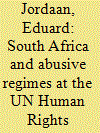

|
|
|
|
|
| Publication |
2014.
|
| Summary/Abstract |
There is some dispute over the extent to which South Africa has become a defender of regimes that abuse human rights. This article sheds further light on this question by focusing on South Africa's positions during the UN Human Rights Council's engagement with human rights problems in six countries: Democratic Republic of Congo, Israel, North Korea, Myanmar, Sri Lanka, and Sudan. In five of the six chosen cases, South Africa's attitude ranged from reluctant to obstructive of efforts to defend human rights. In only one case-Israel-was South Africa willing to bring to bear the full weight of the council's power. These findings strengthen the argument that South Africa is prone to shielding regimes that abuse human rights.
|
|
|
|
|
|
|
|
|
|
|
|
|
|
|
|
| 8 |
ID:
165910
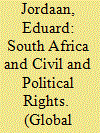

|
|
|
|
|
| Summary/Abstract |
For constructivists, a state’s identity implies its preferences, interests, and resultant actions in international affairs, which is why constructivists expect democracies to support human rights internationally. This study examines South Africa’s record on civil and political rights at the UN Human Rights Council. While there is an element of anti-imperialism in South Africa’s identity that might help explain some of its actions, human rights remain important in South Africa’s self-understanding. Despite the presence of human rights in South Africa’s identity, at the Human Rights Council, South Africa’s actions have ranged from failing to uphold civil and political rights to supporting their restriction. A bifurcated national identity therefore diminishes the predictive power of a constructivist national identity approach.
|
|
|
|
|
|
|
|
|
|
|
|
|
|
|
|
|
|
|
|
|